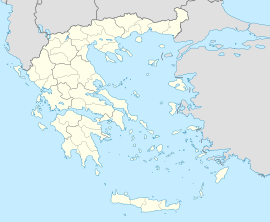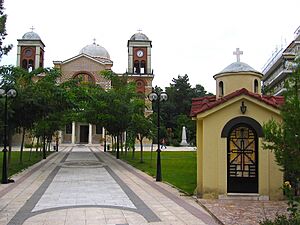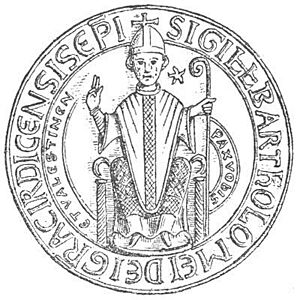Karditsa facts for kids
Quick facts for kids
Karditsa
Καρδίτσα
|
|
|---|---|
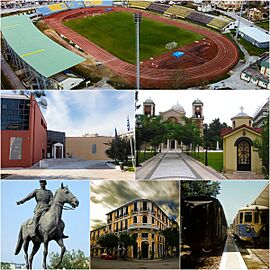 |
|
| Country | Greece |
| Administrative region | Thessaly |
| Regional unit | Karditsa |
| Area | |
| • Municipality | 647.4 km2 (250.0 sq mi) |
| • Municipal unit | 110.1 km2 (42.5 sq mi) |
| Elevation | 108 m (354 ft) |
| Population
(2021)
|
|
| • Municipality | 55,979 |
| • Municipality density | 86.467/km2 (223.950/sq mi) |
| • Municipal unit | 44,700 |
| • Municipal unit density | 406.0/km2 (1,051.5/sq mi) |
| Community | |
| • Population | 40,272 (2021) |
| Time zone | UTC+2 (EET) |
| • Summer (DST) | UTC+3 (EEST) |
| Postal code |
431 00
|
| Area code(s) | 24410 |
| Vehicle registration | ΚΑ |
| Website | dimoskarditsas.gov.gr |
Karditsa (Greek: Καρδίτσα, romanized: Kardítsa) is a city in western Thessaly, a region in mainland Greece. It is the main city and capital of the Karditsa regional unit.
People have lived in this area since about 9000 BC. Karditsa is connected by GR-30 and other roads. It is located southwest of Palamas and Larissa, and east-southeast of Trikala.
Karditsa has many schools, including elementary, junior high, and high schools. It is also home to parts of the University of Thessaly. This includes one of only two Veterinary Medicine departments in all of Greece. The city also has churches, banks, a post office, a train station, and sports areas. Karditsa is known as one of the most bicycle-friendly cities in Greece. It has many bike paths. About 30% of all travel in the city is done by bicycle!
Contents
What is the climate like in Karditsa?
Karditsa has a hot-summer Mediterranean climate. This means it has hot, dry summers. The winters are cool and get a good amount of rain.
| Climate data for Karditsa | |||||||||||||
|---|---|---|---|---|---|---|---|---|---|---|---|---|---|
| Month | Jan | Feb | Mar | Apr | May | Jun | Jul | Aug | Sep | Oct | Nov | Dec | Year |
| Mean daily maximum °C (°F) | 10.25 (50.45) |
13.54 (56.37) |
11.76 (53.17) |
20.28 (68.50) |
25.29 (77.52) |
30.73 (87.31) |
32.31 (90.16) |
31.39 (88.50) |
27.78 (82.00) |
21.85 (71.33) |
15.33 (59.59) |
10.36 (50.65) |
20.91 (69.63) |
| Daily mean °C (°F) | 5.36 (41.65) |
6.83 (44.29) |
10.49 (50.88) |
14.86 (58.75) |
19.85 (67.73) |
25.59 (78.06) |
26.68 (80.02) |
25.38 (77.68) |
21.73 (71.11) |
15.95 (60.71) |
10.38 (50.68) |
6.47 (43.65) |
15.80 (60.43) |
| Mean daily minimum °C (°F) | 1.94 (35.49) |
2.81 (37.06) |
5.28 (41.50) |
8.65 (47.57) |
13.08 (55.54) |
16.28 (61.30) |
17.75 (63.95) |
17.29 (63.12) |
13.91 (57.04) |
10.50 (50.90) |
5.49 (41.88) |
2.46 (36.43) |
9.62 (49.32) |
| Average precipitation mm (inches) | 82.64 (3.25) |
77.22 (3.04) |
59.32 (2.34) |
62.20 (2.45) |
45.88 (1.81) |
19.50 (0.77) |
14.01 (0.55) |
16.78 (0.66) |
26.91 (1.06) |
91.44 (3.60) |
90.18 (3.55) |
91.01 (3.58) |
677.09 (26.66) |
| Mean monthly sunshine hours | 113.51 | 122.05 | 165.50 | 206.01 | 267.05 | 330.90 | 333.92 | 310.91 | 237.76 | 170.41 | 121.35 | 102.84 | 2,482.21 |
| Source: Hellenic National Meteorological Service | |||||||||||||
What is the history of Karditsa?
The name Karditsa has an interesting past. Some people think it comes from a Slavic word, Gradista, meaning "fortified place." Others believe it comes from the Greek word Karyditsa, which means "little walnuts."
During the time of the Ottoman Empire in Thessaly, the area was called Sotira. In 1810, a traveler named William Martin Leake wrote about a large village called Kardhítza. Most of its 500-600 houses were home to Turkish people.
Karditsa officially became a new city in 1882. This was just one year after Greece gained its freedom from the Ottoman Empire in 1881.
During World War II, a group called the ELAS fought against the invaders in Thessaly. On March 12, 1943, ELAS temporarily freed Karditsa. This happened after the Italian forces gave up.
In September 2020, the city faced terrible floods. Sadly, four people lost their lives.
How is Karditsa organized?
The municipality of Karditsa was created in 2011. This happened when five smaller municipalities joined together. These areas became municipal units:
- Itamos
- Kallifoni
- Kampos
- Karditsa
- Mitropoli
The total area of the municipality is about 647 square kilometers. The main municipal unit of Karditsa covers about 110 square kilometers.
Subdivisions of Karditsa
The municipal unit of Karditsa is split into six smaller areas. These are called communities:
- Agiopigi
- Artesiano
- Karditsa
- Karditsomagoula
- Palioklissi
- Rousso
How has the population changed over time?
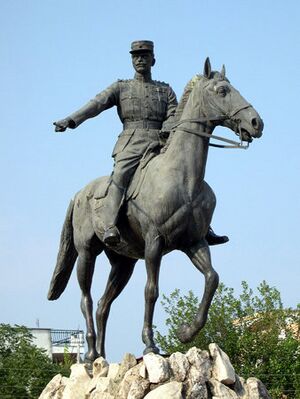
Here's how the population of Karditsa has grown:
| Year | Community | Municipal unit | Municipality |
|---|---|---|---|
| 2001 | 35,971 | 41,411 | - |
| 2011 | 39,119 | 44,002 | 56,747 |
| 2021 | 40,272 | 44,700 | 55,979 |
What about education in Karditsa?
Karditsa is home to several university departments. The Veterinary Medicine Department of the University of Thessaly is located here. It is one of only two such departments in all of Greece. There are also three other university departments from the University of Thessaly in the city.
How do people travel in Karditsa?
Karditsa has a train station. It is on the Palaiofarsalos-Kalambaka line. From here, you can take trains to both Athens and Thessaloniki.
Sports in Karditsa
Karditsa has many sports clubs. Most of them play football (soccer). Some of the well-known football clubs are Anagennisi Karditsa F.C. 1904, A.S. Karditsa, AO Karditsa, Asteras Karditsas, and Elpides Karditsas. There is also a volleyball club called SPA Karditsa.
| Sport clubs based in Karditsa | |||
|---|---|---|---|
| Club | Founded | Sports | Achievements |
| Anagennisi Karditsas | 1904 | Football | Played in Beta Ethniki (a higher league) |
| AO Karditsa | 1966 | Football | Also played in Beta Ethniki before |
| ASK Karditsa | 2006 | Basketball | Plays in Alpha Ethniki (top league) |
| SPA Karditsa | 1987 | Volleyball | Plays in A2 Ethniki volleyball (a higher league) |
| Elpides Karditsas | 1994 | Football | Plays in A Ethniki women (top women's league) |
Who are some famous people from Karditsa?
Many famous people come from Karditsa:
- Ioannis Bourousis, a Greek basketball player
- Antigoni Drisbioti, a Greek Olympic race walker
- Charilaos Florakis, a political leader
- Georgios Karaiskakis, a hero of the Greek War of Independence
- Alexandros Papamichail, a Greek Olympic race walker
- Helena Paparizou, a Greek singer who won the 2005 Eurovision Song Contest
- Nikolaos Plastiras, a Greek army officer and former Prime Minister
- Georgios Siantos, a communist politician and Greek Resistance figure
- Dimitris Sioufas, a Greek politician
- Dimitrios Tsiamis, a Greek triple jumper
- Panagiota Tsinopoulou, a Greek Olympic race walker
- Seraphim of Athens, a former Archbishop of Athens
- Stefanos Tsitsipas, a Greek tennis player
What is Lake Plastiras?
The municipality of Karditsa is also home to the famous Lake Plastiras. It is a beautiful lake in the area.
Images for kids
See also
 In Spanish: Karditsa para niños
In Spanish: Karditsa para niños


